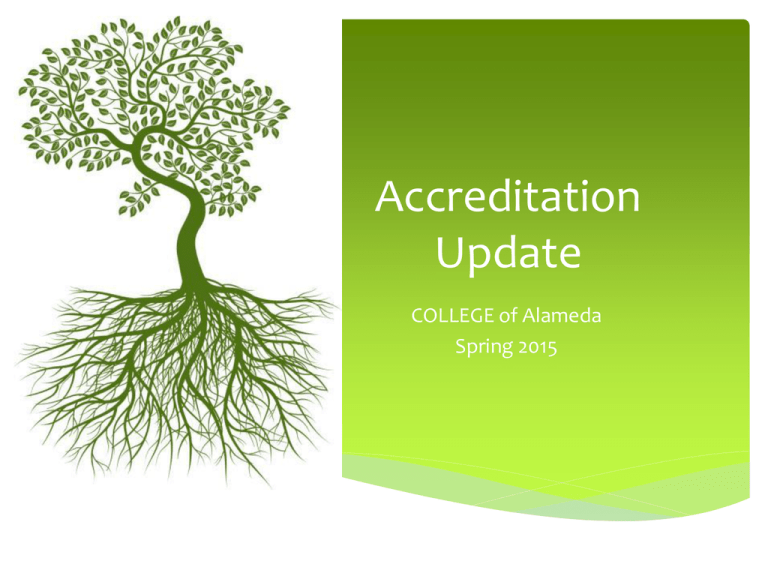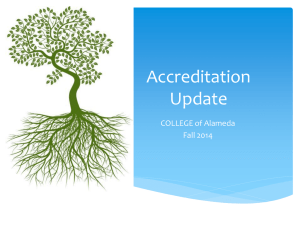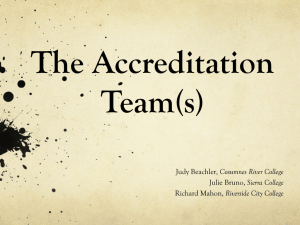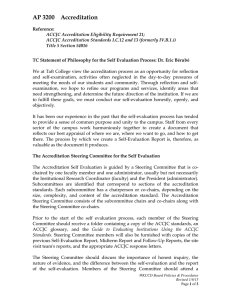Spring 2015 Opening Day Presentation
advertisement

Accreditation Update COLLEGE of Alameda Spring 2015 Why, Who, How Peer review is at the heart of accreditation, including the periodic review and revision of the Standards “We” do – the member institutions through representation on a regional accrediting commission The Standards are: Mutually Agreed Upon, Shared Expectations Based Upon Best Professional Practices External Requirements From Governmental Agencies Assure Quality of Institution Along Multiple Domains Timeline November 2014: 1st read of Self-Evaluation by Board of Trustees, Approved by College Council; Academic Senate Acceptance December 2014: Approval of Self-Evaluation by Board of Trustees January 2015: Self Evaluation received from printers March 9-12, 2015: Site Visit June 2015: Accreditation Commission Meets July 2015: College receives Team Evaluation Report and Status Where We Are Steering Committee has met weekly over summer/fall Self-Evaluation (completed)- Board Affirmed on 12/7 Self-Evaluation (completed)- Copies to ACCJC 1/9 Self-Evaluation (completed)- Copies to Visiting Team Visiting Team (planning)- March 9-12 Visiting Team During the week of March 9 the College will host a visiting team of our peers between 8-12 members Visiting Team members are Community College: College Presidents Faculty Administrators/Managers Coordinators What to Expect The team is here to affirm the content of the self-evaluation Measure the College in relation to the Accreditation Standard and Eligibility Requirements; not California Ed Code or Title 5 Members will request documents throughout the visit Requests will be made to meet with individuals or committee representatives to clarify/affirm information. Members may drop into classes (online and/or F2F) On the final day the team will make a general statement, but not the accredited status or final recommendation. No questions will be taken. Substantive Change Establishing an Additional Location Geographically Apart from the Main Campus at which the Institution offers at least 50% of an Educational Program Addition of a Program or Courses that Represents a Significant Departure from an Institution’s Current Programs or Curriculum A program offered in face-to-face format is now offered 100% online. An institution develops a new degree or career technical education certificate program to be offered at the main campus or at any one of the approved institutional sites off campus. Addition of a New Degree or Career Technical Education Certificate Program that Represents a Significant Departure from an Institution’s Current Programs Addition of Courses that Constitute 50% or More of the Units in a Program Offered through a Mode of Distance or Electronic Delivery, or Correspondence Education An institution offers courses that make up 50% or more of the credits required for a program through an instructional delivery that is new for the college or the program. Questions? Contact Me Tim Karas Vice President of Instruction tkaras@peralta.edu Go to Accreditation webpage http://alameda.peralta.edu/accreditation/ Mission Statement The Mission of College of Alameda to serve the educational needs of its diverse community by providing comprehensive and flexible programs and resources that empower students to achieve their goals. Vision The Vision of College of Alameda is that we are a diverse, supportive, empowering learning community for seekers of knowledge. We are committed to providing a creative, ethical and inclusive environment in which students develop their abilities as thinkers, workers and citizens of the world. Values We use this vision to choreograph three central themes in our quest for “learning excellence” and services to students. Academic Excellence Budgetary Competence, and Community Engagement We call these “our ABCs” emphasizing crucial success indicators for our students in achieving an enhanced capacity to pursue their dreams! Institutional Set Standards Effective Spring 2013 Higher Education Opportunities Act 2008; United States Department of Education Guidelines 34 C.F.R 602.16(a)(1)(i), January 2012 “Standards effectively address success with respect to student achievement…and the institution’s performance with respect to student achievement is assessed.” COA Initial Set Standards Spring 2012 Course Completion (percentage of students who successfully complete a course) 67% Fall 2013 68.4% Student Retention (Percentage of students who are retained fall to Fall) 54% FALL 2012 49.4% (63.6% FT/ 47.5%PT) FY14/15: Dialog leading to consensus benchmarks






